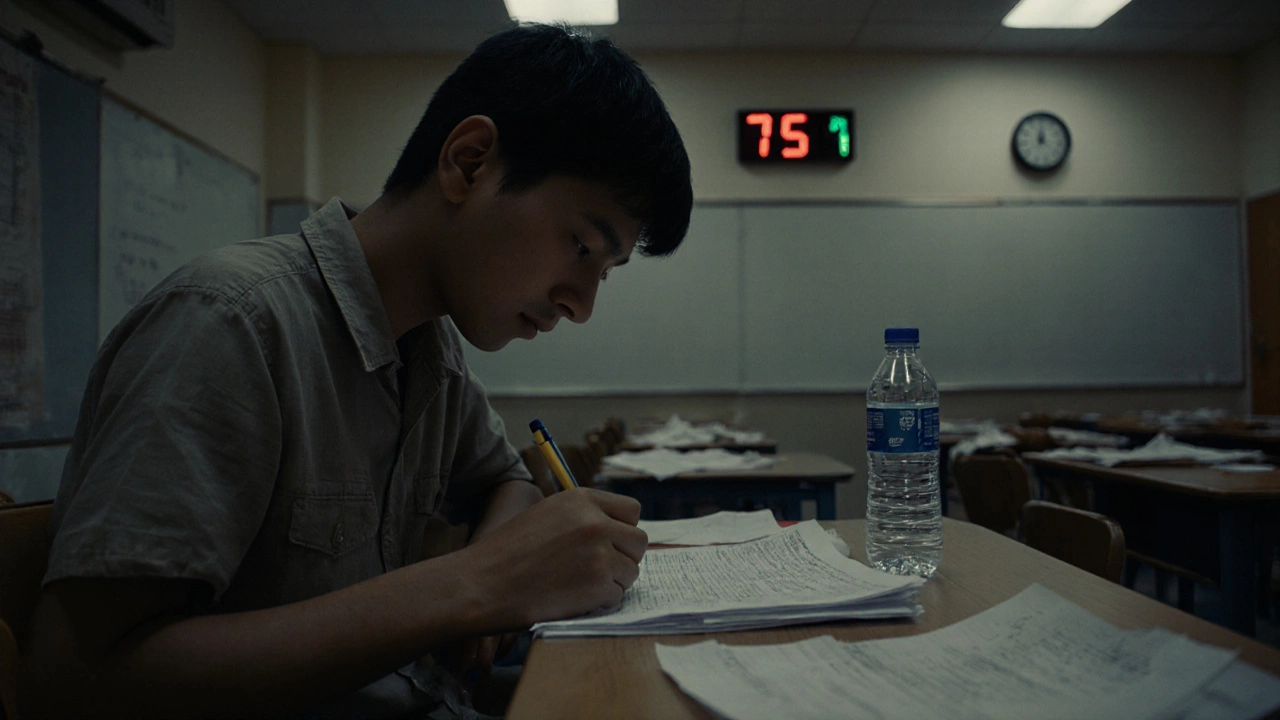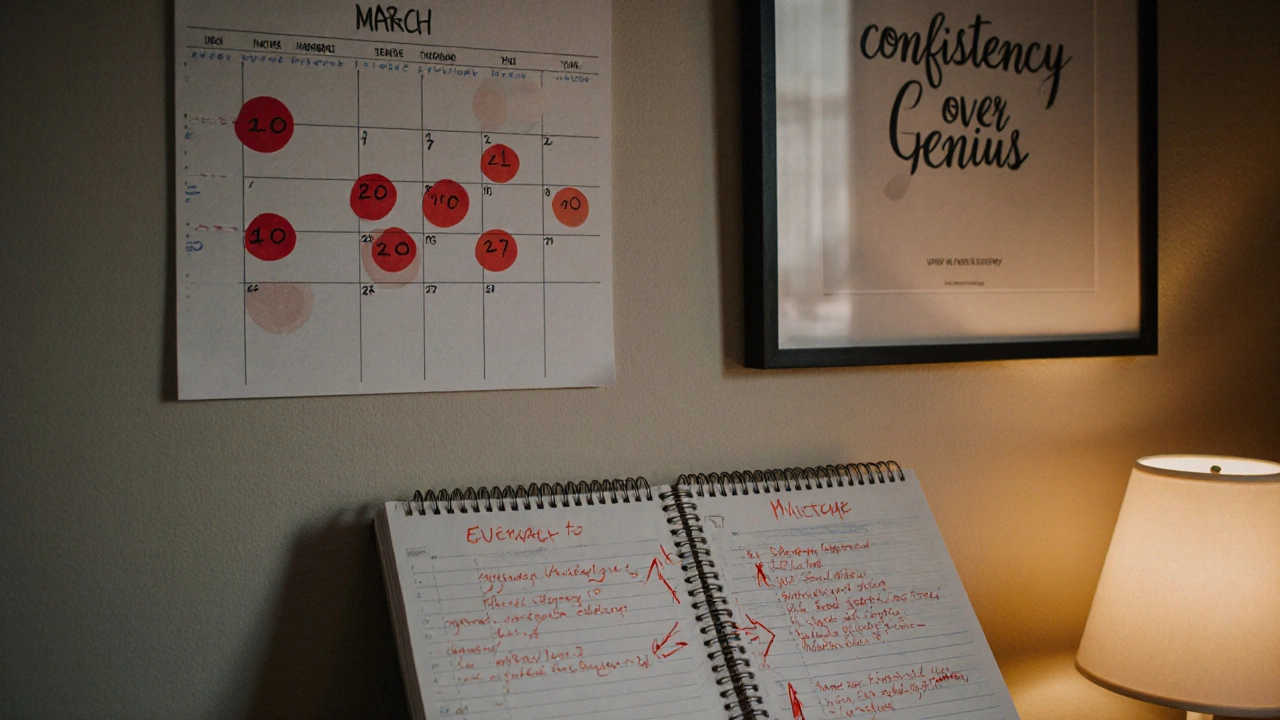JEE Main Score to Rank Estimator
Based on historical JEE Main data, estimate your rank to see if you're on track for JEE Advanced. The article suggests you should consistently score above 90% in mocks by March.
Enter your score to see your estimated rank.
Cracking IIT JEE on your first try isn’t about being a genius. It’s about consistency, smart work, and knowing exactly what to focus on. Every year, over 1.5 million students take JEE Main, and less than 10% make it into an IIT. But those who do? They didn’t study 18 hours a day. They studied the right things, at the right time, with the right mindset.
Understand the Exam Structure First
JEE has two parts: JEE Main and JEE Advanced. You must clear JEE Main to even sit for JEE Advanced. JEE Main tests your understanding of Physics, Chemistry, and Math at a national level. JEE Advanced is harder - it’s not just about solving problems, but about how deeply you think through them.
For JEE Main, the syllabus is based on Class 11 and 12 NCERT. That’s it. No extra books needed to start. But JEE Advanced adds twists - multi-concept questions, tricky options, and time pressure. You need speed and accuracy. Most students fail because they prepare for JEE Main like it’s the final goal. It’s not. It’s the gateway.
Build a Realistic Study Schedule
Forget studying 14 hours a day. That’s unsustainable. Top performers study 6-8 focused hours daily, with breaks. The key is daily rhythm, not marathon sessions.
Here’s a simple weekly structure that works:
- Monday-Friday: 2 subjects per day (e.g., Physics + Math in morning, Chemistry + revision in evening)
- Saturday: Full-length mock test (simulate exam conditions - no phone, no distractions)
- Sunday: Analyze mistakes, revise weak topics, plan next week
Each subject gets 2-3 hours daily. That’s enough if you’re focused. Don’t jump between topics. Stick to one topic per session. For example, spend 90 minutes on Newton’s Laws, solve 15 problems, then move on. No switching to organic chemistry halfway.
Master NCERT Before Anything Else
Over 70% of JEE Main questions come directly from NCERT textbooks. Not paraphrased. Not reworded. Exact concepts. Yet most students skip NCERT and buy 10 expensive books. That’s a mistake.
Go through each chapter of Physics, Chemistry, and Math NCERTs line by line. Don’t just read - write summaries. Draw diagrams. Solve every in-text example. If you can’t solve a Class 12 Chemistry NCERT problem, you won’t crack JEE.
For Physics, focus on: Kinematics, Laws of Motion, Work-Energy, Electromagnetism, Optics.
For Chemistry: Periodic Table, Chemical Bonding, Thermodynamics, Organic Reaction Mechanisms, Coordination Compounds.
For Math: Calculus, Algebra, Coordinate Geometry, Trigonometry, Probability.
These are the high-weightage areas. Nail them in NCERT first. Then move to practice books.
Practice with Purpose - Not Just Quantity
Solving 100 problems a day doesn’t help if you’re making the same mistakes. Every problem you solve should teach you something new.
After every practice session, ask yourself:
- Why did I get this wrong?
- Was it a calculation error, concept gap, or misread question?
- Can I explain this to someone else?
Keep a mistake journal. Write down the question, your wrong answer, the correct approach, and the concept you missed. Review it every weekend. This is how top rankers improve - not by doing more, but by fixing what breaks them.
Use previous years’ papers (2019-2025). They’re the best indicator of what’s asked. Don’t waste time on random online question banks. Stick to official JEE papers. They’re free on the NTA website.

Mock Tests Are Non-Negotiable
You can’t learn to swim by reading books. You have to jump in. Same with JEE. You need to take 15-20 full mock tests before the real exam.
Start taking mocks from December of Class 12. Use the same pattern as JEE Main: 90 minutes for each subject, 75 questions total. Time yourself strictly. No extra breaks.
After each test:
- Check your score and rank
- Identify which topics cost you the most marks
- See where you wasted time - was it a long calculation? A confusing question?
- Adjust your strategy for the next test
By March, you should be consistently scoring above 90% in mocks. That’s the target. If you’re not there, you’re not ready.
Focus on Weak Areas - But Don’t Ignore Strengths
Many students spend 80% of their time on weak topics. That’s wrong. You need balance.
Here’s the 70-30 rule: 70% of your time on improving weak areas, 30% on maintaining strengths. Why? Because JEE doesn’t reward perfection in one subject. It rewards consistency across all three.
If you’re strong in Math but weak in Chemistry, don’t skip Math practice. Keep solving 10 problems daily. But spend extra time on Chemistry concepts you keep missing. Use YouTube videos from reliable channels like Khan Academy or Unacademy JEE to clarify doubts. Don’t just watch - pause, rewind, solve along.
Manage Stress - It’s the Silent Killer
Most students crack under pressure. Not because they didn’t study enough, but because they burned out.
Get 7-8 hours of sleep. Eat regular meals. Walk for 20 minutes daily. Don’t compare yourself to others on social media. Every topper had a bad day. The difference? They got back up.
If you feel overwhelmed, take a day off. Not a week. One day. Rest your brain. Go for a walk. Listen to music. Talk to someone. You’re not a machine.

Final Month Strategy - Less Learning, More Recall
In the last 30 days, stop learning new topics. Focus on revision. Go through your mistake journal. Re-solve 10-15 key problems from each subject. Do 2-3 full mocks under exam conditions.
On the night before the exam, don’t study. Sleep. Eat well. Arrive early. Breathe. You’ve done the work. Now trust it.
What to Avoid at All Costs
- Buying 10 books and not finishing one
- Following ‘toppers’ who say they studied 20 hours a day
- Ignoring NCERT
- Skipping mock tests
- Comparing your progress to others
- Procrastinating until Class 12
These are the traps. Avoid them, and you’re already ahead of 80% of candidates.
Realistic Expectations
Cracking IIT on your first attempt is hard. But it’s not impossible. Around 15,000 students clear JEE Advanced every year. Most of them are first-timers. You don’t need to be the smartest. You need to be the most consistent.
If you follow this plan - NCERT first, practice with purpose, mocks regularly, rest when needed - you have a real shot. It’s not magic. It’s method.
Can I crack IIT JEE without coaching?
Yes, absolutely. Many top rankers are self-studied. Coaching helps if you need structure, but it’s not a guarantee. What matters is discipline, access to good resources (NCERT, previous papers, YouTube), and a consistent schedule. If you can manage your time and stay focused, coaching adds little value.
How many hours should I study daily for JEE?
6-8 focused hours is enough if you’re consistent. Quality beats quantity. Studying 12 hours while distracted or exhausted leads to burnout. Focus on deep work: 90-minute blocks with no phone, no interruptions. Two such sessions a day, with breaks, are better than 10 hours of half-hearted study.
Is JEE Advanced harder than JEE Main?
Yes, significantly. JEE Main tests your understanding of concepts. JEE Advanced tests how well you can combine multiple concepts under pressure. A question might require you to use calculus, physics, and coordinate geometry together. That’s why mock tests and deep revision matter more than rote learning.
Which books are best for JEE preparation?
Start with NCERT. Then use: Physics - H.C. Verma; Chemistry - O.P. Tandon and J.D. Lee; Math - R.D. Sharma and Cengage. But don’t buy all at once. Finish one book before moving to the next. Many students collect books like trophies and never solve them.
Can I crack IIT if I start in Class 12?
Yes, but you’ll need to work smarter. Focus on high-weightage topics first. Skip low-yield chapters. Use NCERT as your base. Take mocks from January. Dedicate 8 hours daily. With discipline, you can still get into an IIT - many have done it.
How important are previous year papers?
Extremely. They show the exact pattern, difficulty level, and frequently repeated concepts. Solve papers from 2019 to 2025. Don’t just solve - analyze. Why was that question asked? What concept does it test? This is how you predict what might come next.
